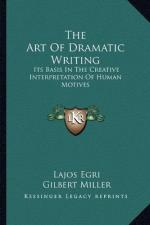
|
| Name: _________________________ | Period: ___________________ |
This test consists of 15 multiple choice questions and 5 short answer questions.
Multiple Choice Questions
1. What term refers to the process of finding two differing bodies, making them the protagonist and antagonist, and making these characters so well defined that you are allowed to put them into a situation in which they are unable to make a compromise?
(a) Conflict escalation.
(b) Conflict creation.
(c) Dramatic writing.
(d) Orchestration.
2. The author asserts that one key factor in obtaining conflict is what?
(a) Love.
(b) Hate.
(c) Growth.
(d) Antagonist.
3. Where is the man who meets the dog going in the author's scenario in Book II, Character, Chapter 11: Unity of Opposites?
(a) The courthouse.
(b) Work.
(c) A restaurant.
(d) The Library.
4. Who is the father of Oedipus?
(a) Jocasta.
(b) Creon.
(c) King Laius.
(d) King Pelops.
5. What is needed to make life keep constantly going, according to the author in Book II: Character, Chapter 3: The Dialectical Approach?
(a) Motion.
(b) Money.
(c) Determination.
(d) Faith.
6. Who is Macbeth's friend and a general in the army in "The Tragedy of Macbeth"?
(a) Macduff.
(b) Lennox.
(c) Donalbain.
(d) Banquo.
7. Who wrote the play "A Doll's House"?
(a) Anton Chekhov.
(b) August Strindberg.
(c) Henrik Ibsen.
(d) William Shakespeare.
8. What term is called storyline, the plan, scheme, or main story of a literary or dramatic work, as a play, novel, or short story?
(a) Drama.
(b) Plot.
(c) Meaning.
(d) Tale.
9. What does Lajos Egri state first and foremost the writer must have of his characters?
(a) Empathy.
(b) Emotion.
(c) Irony.
(d) Understanding.
10. When did Lajos Egri come to the United States?
(a) 1899.
(b) 1900.
(c) 1904.
(d) 1906.
11. What are defined as habitual patterns of behavior, thought, and emotion?
(a) Personality traits.
(b) Mentality.
(c) Prerogative.
(d) Opinion.
12. What does the author claim causes motion in Book II: Character, Chapter 3: The Dialectical Approach?
(a) Kinetic energy.
(b) Contradiction.
(c) Commotion.
(d) Craziness.
13. Who translated Ibsen's "The Pillars of Society" to English?
(a) Lajos Egri.
(b) Anton Chekhov.
(c) William Archer.
(d) August Strindberg.
14. What refers to a settlement of differences by mutual concessions, an agreement reached by adjustment of conflicting or opposing claims?
(a) Treaty.
(b) Truce.
(c) Compromise.
(d) Qualm.
15. Lajos Egri asserts that growth is a real character's reaction to his _____.
(a) Environment.
(b) Accomplishments.
(c) Conflict.
(d) Luck.
Short Answer Questions
1. Who wrote "Oedipus Rex"?
2. What Classic Greek philosopher claimed character was secondary to action?
3. A play, according to the author, will not work without what central figure who drives the action?
4. What has a reigning power in the presence of a written piece of work according to Lajos Egri?
5. In Book II, Character, Chapter 11: Unity of Opposites, the author states that the antagonist and pivotal character absolutely cannot do what?
|
This section contains 411 words (approx. 2 pages at 300 words per page) |

|




